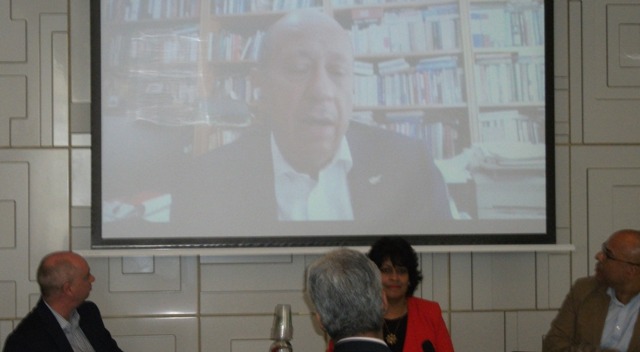 Former High Commissioner Euripides Evriviades on the screen. At the table are (l-r) Prof Philip Murphy, Keshini Navaratnam and former High Commissioner Guy Hewitt
Former High Commissioner Euripides Evriviades on the screen. At the table are (l-r) Prof Philip Murphy, Keshini Navaratnam and former High Commissioner Guy Hewitt
The twice-postponed Kigali Commonwealth summit is now due to take place in the week beginning 20 June 2022. The leaders’ debate is likely to be lively. Can the significant decline in resources be reversed and new relevance and impact be restored to the Commonwealth’s programmes? With a hotly-contested election for the post of Secretary-General under way, a controversial Chair-in-Office, and Prince Charles assuming a greater role in representing the Head, will the Commonwealth have the leadership necessary for future challenges? With recurrent questions about Rwanda’s commitment to human rights and controversy about how Commonwealth nations should treat refugees and migrants, is the association doing enough to maintain its values? And can the Commonwealth’s networks sustain it as a relevant soft power organisation for the twenty-first century, given the current turbulence in international relations following Russia’s invasion of Ukraine?
Is the Commonwealth working? This was the theme of a pre-CHOGM [Commonwealth Heads of Government Meeting] discussion held on 27 May at the Institute of Commonwealth Studies, University of London.
This event, which included in-person and virtual panellists and audiences, was organised by The Round Table: The Commonwealth Journal of International Affairs and the Institute of Commonwealth Studies, in partnership with the Commonwealth Foundation and the Commonwealth Association.
SESSION 2: Leadership
Round Table Editorial Board member and former BBC anchor Keshini Navaratnam chaired the second session on leadership. Her panel consisted of the Professor of British and Commonwealth History at the University of London, Philip Murphy, career diplomat and former Cyprus High Commissioner to the UK, Euripides Evriviades, and former High Commissioner for Barbados to the UK, Guy Hewitt.
The panel explored the structure of the Commonwealth and the way the Commonwealth Secretary-General is elected, as well as the way the roles of Head of the Commonwealth and Chair in Office have evolved.
Professor Murphy spoke of the “deep structural problems” behind the leadership of the Commonwealth as a result of being it being “the product of a collapsing empire.”. He said that leaders had deliberately created a role of Secretary-General with “vague and weak” powers in order not to compromise their own independence. He thought there were many factors which militated against change. He also questioned the value of the roles of Commonwealth Chair-in-Office and Head of the Commonwealth. The experiment of having a Chair-in-Office had failed for three reasons: “(Mahinda) Rajapaksa, (Boris) Johnson, and (Paul) Kagame”.
Mr Evriviades said that the selection of the Secretary-General would be the “hottest issue” at the upcoming Commonwealth Heads of Government Meeting. He said that the Commonwealth could not be everything to everyone, a sort of Christmas tree on which to hang every wish. He also said that high commissioners should not be “downgraded” and used for “rubber stamping” Commonwealth decisions and suggested that that the Commonwealth’s top civil servant “should be more Secretary than General.”
Revd Hewitt said that there was a “cloud of uncertainty” over the leadership of the Commonwealth. This included “a personally embattled chair” and the “question of who will be the next SG.” He called for more transparency and accountability in the running of the Commonwealth Secretariat and suggested a greater role for foreign ministers and high commissioners. He drew a distinction between supporting “republicanism in Barbados” and “democratising the Headship”, a proposition he would not support until member countries found a viable replacement. He said that it was time for a new system of governance and that CHOGM 2022 needed to reverse “the present path of descent and decline.”
The Q&A session discussed the need to look at follow-through and accountability on major decisions and principles. The suggestion was made that the election of the Secretary-General should take place before the CHOGM, in order not to crowd out other substantive issues. Discussants also questioned the need for a chair-in-office.
View the session on Leadership
[Filming and video by David Aitken-Smith and Melissa Aitken-Smith.
Text and photos by Debbie Ransome.]
Related articles:
Guy Hewitt’s full paper on Leadership
View the opening and session one on Networks
View session three on Values
View session four on Programmes
Related articles:
Rwanda and CHOGM 2020 – Round Table Journal
CHOGM diary 2010 – Round Table Journal
CHOGM diary Sri Lanka – Round Table Journal 2014
CHOGM 2008: Notes from a CHOGM novice – Round Table Journal



